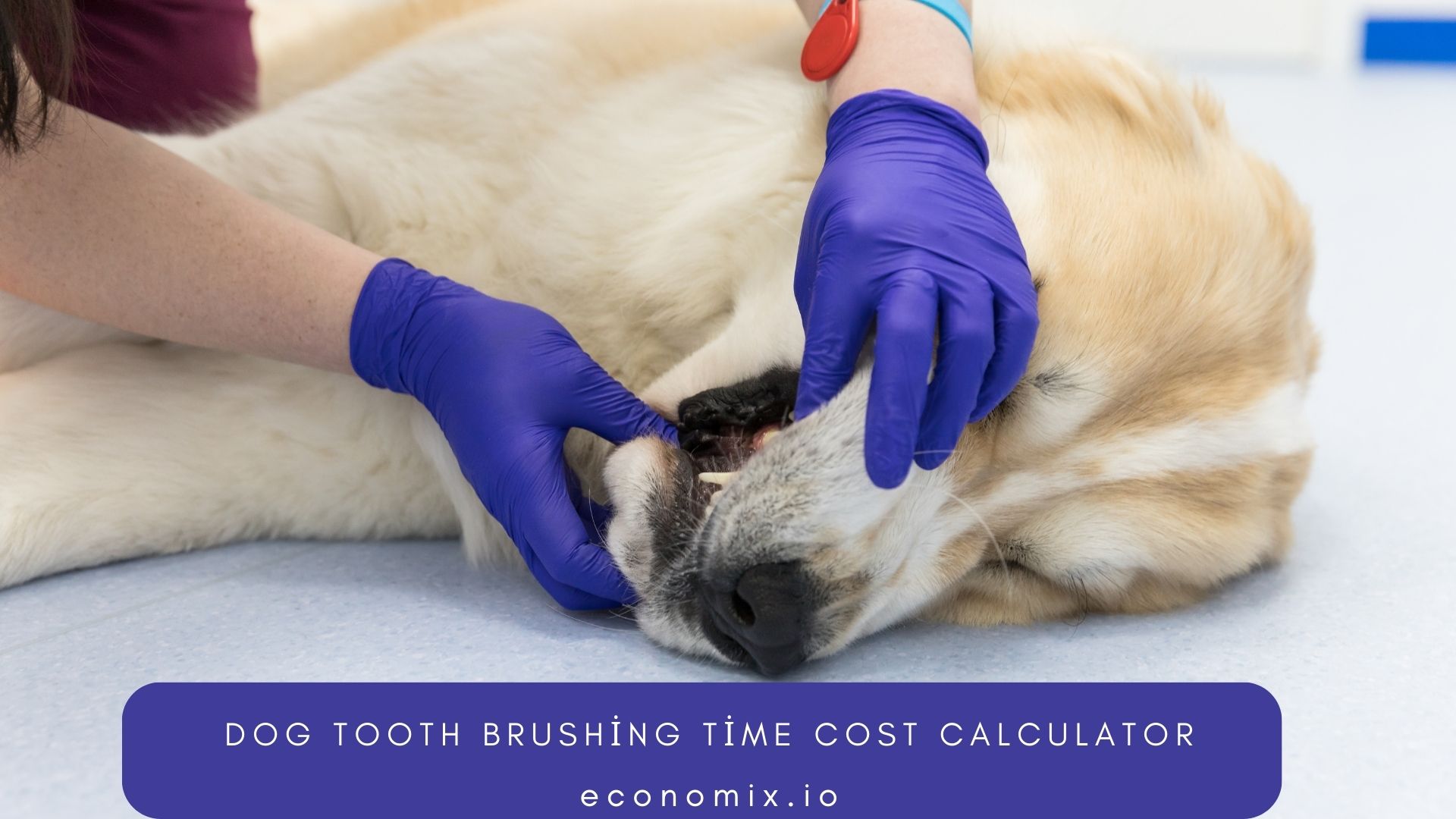Table of Contents
- Why Brush Your Dog’s Teeth?
- Using the Dog Tooth Brushing Time Cost Calculator
- Key Benefits of Regular Tooth Brushing
- Tips for Brushing Your Dog’s Teeth
Last updated: July 25, 2024.
Simplify Your Pet Care Routine with the Dog Tooth Brushing Time Cost Calculator

Keeping your dog's teeth clean is essential for their overall health and happiness. Regular brushing helps prevent dental diseases, bad breath, and other serious health issues. However, many pet owners struggle with the time and consistency required for this task. Enter the Dog Tooth Brushing Time Cost Calculator—a free online tool available on Economix.io that helps you estimate the total time you spend brushing your dog's teeth and aids in planning your pet care routine more efficiently.
Why Brush Your Dog’s Teeth?
It is estimated that over 80% of dogs over the age of three have periodontal disease, an inflammation or infection of the tissues surrounding the teeth. This starts as gingivitis caused by plaque and can progress to involve the bony tooth sockets. If left untreated, it can lead to painful tooth loss.
Regular brushing helps prevent plaque buildup and tartar formation. Plaque can accumulate on the teeth within hours after a meal and, if not removed, can harden into tartar, leading to periodontal disease. Consistent dental care is vital for your dog's health and comfort.
Using the Dog Tooth Brushing Time Cost Calculator
This calculator is designed to estimate the time you spend brushing your dog's teeth. Simply enter the number of times you brush your dog's teeth each week and the average duration of each session. The calculator will then compute the total brushing time over different periods (weekly, monthly, semi-annually, and annually).
Example:
- Brushing Frequency: 3 times per week
- Average Duration per Brushing: 5 minutes
By using this tool, you can plan your pet care routine more effectively and ensure you allocate enough time for this important task.
Key Benefits of Regular Tooth Brushing
Prevent Dental Diseases
Regular brushing helps remove plaque and prevent tartar buildup, reducing the risk of periodontal disease. This can save your dog from painful dental issues and expensive veterinary treatments. Read more about periodontal disease in dogs.
Fresh Breath
Consistent dental care keeps your dog's breath fresh. No more worrying about bad breath when your furry friend wants to cuddle.
Overall Health
Good dental hygiene is linked to better overall health. Preventing infections in the mouth can help prevent them from spreading to other parts of the body, such as the heart and kidneys.
Tips for Brushing Your Dog’s Teeth
Start Early
It is best to teach your dog to accept tooth brushing while he is still a puppy. However, even older dogs can learn to tolerate and even enjoy the process with patience and positive reinforcement.
Use the Right Tools
Choose a toothbrush designed for dogs. Options include finger brushes for smaller dogs or brushes with angled handles for better reach. Always use toothpaste formulated for pets—human toothpaste can be harmful if swallowed. Learn more about dog toothbrushes.
Make It a Positive Experience
Choose a quiet time and place. Hold your dog securely and gently rub their teeth and gums with your finger before introducing the toothbrush. Praise and reward your dog throughout the process to make it enjoyable.
Be Consistent
Aim to brush your dog’s teeth at least three times a week. Regular brushing helps prevent plaque buildup and makes the routine familiar and comfortable for your dog.
Using the Dog Tooth Brushing Time Cost Calculator from Economix.io can help you manage and streamline your pet care routine. By understanding how much time you spend on brushing, you can plan more effectively and ensure your dog gets the dental care they need. Regular brushing leads to better health, fresher breath, and a happier pet.
Take advantage of this free tool to keep your dog’s dental health in check and make brushing a regular part of your routine. Your furry friend will thank you with a bright smile and fresh breath!
- Weir, Malcolm, DVM, MSc, MPH; Hiscox, Lorraine DVM FAVD Dip. AVDC; Bellows, Jan, DVM, Dipl. AVDC, ABVP. "Brushing Your Dog's Teeth." VCA Hospitals.
- Sheikh, Zilpah, MD. "Tips for Brushing a Dog’s Teeth." Medically Reviewed, August 28, 2023.